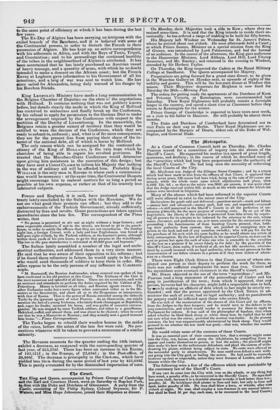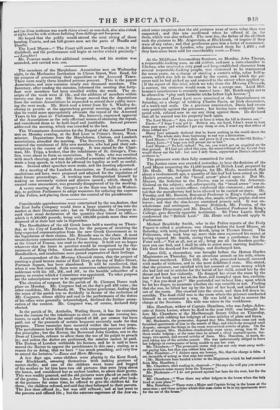mile ifietrapuTia.
At a Court of Common Council, held on Thursday, Mr. Charles Pearson moved for a committee of inquiry into the abuses of the Sheriff's Court. He supported his motion in a speech of great length, acuteness, and drollery; in the course of which he described many of the " atrocities which had long been perpetrated under the authority. of the Sheriff's Courts." He had long seen the necessity of reforming the local Courts of the City.
Mr. Mirehouse was Judge of the Giltspur Street Compter ; and by a return which had been made to him from the officers of that Court, it appeared that during seven years, 126 causes had been tried, being at the rate of 18 causes per annum, while the whole sums upon which adjudication took place, were 2,193/. 13s. 8d. ; so that as the salary was 3001. per annum, it was quite clear that the Judge received within 931. as much as the whole amount for which the suitors were )(waved in litigation.
Many of the abuses which had been reformed in the superior Courts still were allowed to exist in the minor ones of the City. Declarations for goods sold and delivered—quantum meruit —work and labour —money lent and advanced—money paid, laid out, and expended —concessit solvers—is still preserved in the Sheriff's Courts in all the perfection of un- meaning gibberish, for the mere purpose of creating costs. By an act of the Legislature, the liberty of the subject is protected from false arrest, by requir- ing all process fur its retraint to be indorsed by the attorney in the suit, whose name, character, and profession are, as it were, sureties for the correctness of the proceeding : the functionaries of these humbug Courts pretend, that, hold- ing their authority from custom, they are justified in consigning men to prison at the beck and nod of any nameless swindler, who will pay his fee for the purchase of his writ with the same facility as he would obtain any article of daily consumption. By the law of England, in the superior Courts, no man can be sent to prison but upon the oath of some one who is amenable to the i.enalties of the law as a perjurer if he swear falsely to the debt: by the practice of the Sheriff's Court, these oaths, if tendered at all, are but idle mockeries, adminis- tered by a youth invested with no legal authority, who deals out processes for the incarceration of our fellow citizens in a prison as if they were tickets of admis- sion to a theatre.
There were Eight Clerk Sitters in that Court, seven of whom em- ployed one person as their deputy to perform the work for them, as there was not sufficient employment for more than two. Coster and his myrmidons were constant customers in the Sheriff's Court. Mr. Dixon objected to the use of the term " myrmidons ;" and Mr. Pearson read a long statement of the proceedings of Coster and his gang in justification of the term; from which it appeared, that any person, however bad his character, might hold a respectable man to bail, by merely making an affidavit of debt which in fact might be utterly un- founded ; and that the person appointed by the Clerk Sitters to ad- minister the oath of arrest, had no legal authority; and no punishment for perjury could be inflicted upon those who swore falsely. He was sick of the enumeration of the abuses of this Court and its officers, from the Judges to the door. keepers; and he would turn to the defects in its very constitution, and which would render it necessary for them to apply to Parliament for redress. It was said of the philosopher of Ispahan, that when asked whether lie liked black sheep or white sheep best, he replied that he did not care what was the colour, provided the mutton was tender. In the present instance, the law was unquestionably administered by black sheep. They would proceed to see whether the law itself was good,—that was, whether the mutton was tender.
He would relate some of the customs of these Courts.
It was an essential part of their customary law, that a stranger might come into the City, vex, harass, and annoy the inhabitants, by compelling them to appear and render themselves to prison, or bail the action; the plaintiff might then make his bow to the unfortunate defendant, and plead the custom of with- drawing his plaint, without being subject to costs. No costs were allowed to the successful party in attachments. No man could even defend a suit with- out going into the City goal, or bailing the action. No bail could be received, however oplent or respectable, unless they were freemen of London, and inha- bitants within the City.
The following were a few of the offences which were punishable by the customary law of the Sheriff's Court.
If any cart do come into the City with iron on the wheels, or any thing but bare wood, a penalty of 6s., to be recovered in the Sheriffs' Court. No num shall hot-press cloth, because it is a deceitful attempt tomake it look better than it is ; penalty, W. No bricklayer shall plaster in lime and hair, but only in lime and sand, under penalty of 10s. No man shall blow a horn, or whistle, after nine o'clock at night. No man shall employ a non-freeman in any manual labour; but shall be fined Si. per day, each man, to be recovered in the local Courts;
and (as if one workman was worth thirty wives) no man shall, after nine o'clock at night, beat his wife without forfeiting three shillings and fourpence.
He hoped that the public would attend the next sitting of these humbug Courts, and see full-grown men act the parts of Noodle and Doodle.
The Lord Mayor—" The Court will meet on Tuesday text, in the Guildhall, and the performance will begin at twelve o'clock precisely." ....(Laughter)
Mr. Pearson made a few additional remarks, and his motion was seconded, and carried nem. con.



















 Previous page
Previous page